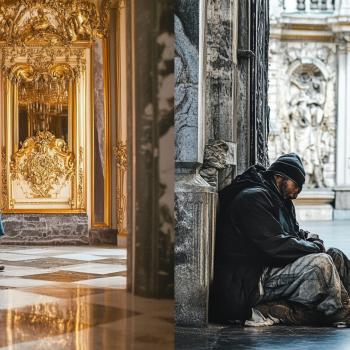In the last few weeks, I've attended two iftars—that is, fast-breaking evening Ramadan meals—in Austin, Texas, where I live. One iftar was in the home of a Muslim family from Turkey. I spent several hours with them and another Turkish family who were sharing that important meal together. Kids from the two families—from 2 to 8 years old—ran around upstairs. At one point they were playing video games; I could hear one explaining to the others that "Wario" is "a bad Mario."
Before and during dinner, the adults, too, gently explained things I didn't understand. Where Islam is concerned, although I do have some Muslim friends and have begun doing some research, that is still plenty.
I learned, for example, that a mosque is not really a church, as many Christians think. Although some Muslims attend a certain mosque regularly, for the men at this dinner, a mosque is simply a place for communal prayer, and whatever mosque is closest at the time is the one they attend. "It is better," one told me, "to stay home and pray with your family than to go to the mosque and pray alone. The building itself is not holy. But it is better to pray in community."
The other iftar was in the headquarters of the Travis County Sheriff's Office, where the sheriff, Greg Hamilton, was hosting a Ramadan event for Muslims and members of the community. A representative of the Austin Police Department, a retired FBI agent, employees from the sheriff's department and the county jails, and some Christian leaders attended this small dinner with local imams and Muslims.
At this dinner, I was fortunate to be at a table between two imams, and across from two ladies who worked in the kitchen at the county jail. Tariq (the young African-American imam to my right) traded stories with me about our respective theological training. I talked to the imam on my left, who had gone from being a Church of Christ pastor to an imam without losing his characteristic interjected "Praise God." Two Turkish Muslims on the other side of him leaned forward smiling and asked if it was true that I had written a book about Islam.
I smiled back. "Not yet," I said.
On both occasions, I met fascinating and authentic people. The Muslims I talked to were gentle and generous, smart and funny, loving fathers and mothers, successful in their jobs. To keep me from over-romanticizing them, I also met a couple of folks who were a little too focused in talking about religion; they reminded me of my Assembly of God grandmother, but if I don't hold it against her, I suppose I shouldn't hold it against them either.
It was clear to me that even those Muslims who annoyed me a little were not my enemies, and that all of the Muslims I met were people who, as William Faulkner said in his Nobel Prize acceptance speech, partook of the universal human truths. While our skin colors, accents, and life experiences might be different, the things that we wanted—to love our families and friends, to be successful in our chosen professions, to love and serve God as we understood God—were precisely the same.
Now, while there were also some commonalities in our faith and practice, we had no illusions that our beliefs were precisely the same; they are not. While our worship of the same God may make us cousins, our differing conception of Jesus—for me, a part of the triune Living God, for them, an honored prophet, but merely a man—means we cannot agree about central elements of our respective faiths.
And yet, I discovered that, being now in some form of relation with them, I could disagree with them without rancor, and likewise they did not seem to hold my seminary training and belief in Jesus as the Christ against me.
I have sat with men arguing about who is the greatest center fielder, running back, or power forward in history, and while this Jesus question is certainly a more elevated debate, these recent conversations about faith reminded me of those past arguments. In those, each man put forward his reasons. Sometimes the conversation was impassioned, because people felt strongly about their positions.
Clearly people knew what they thought, knew what they felt.
But we didn't come to blows; in fact, after we had all said our piece or pieces, we had another beer together.
I don't imagine that those past sports conversations led anyone to change his mind—as if anyone could seriously champion Willie McGee against Mickey Mantle!—anymore than I think these iftar conversations were intended to convert anyone.





